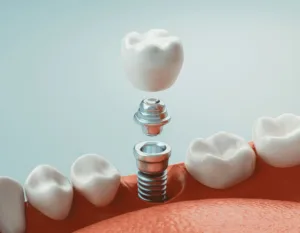When you lose teeth, it is essential to find a tooth replacement treatment quickly. Dental implants are a popular and effective way to replace missing teeth. Unlike other restorative options, your dental implant specialist surgically places the implant in your jawbone. This allows them to fuse with the bone and provides a strong foundation for artificial teeth.
However, the dental implant procedure can be lengthy and involve multiple steps. Therefore, if you are considering dental implants, prepare for the installation process and recovery. This can help set reasonable expectations and ease your recovery experience.

Preparation for Dental Implants
Before getting dental implants, it is vital to have a thorough dental exam and consultation with Dr. Sinclair. He will evaluate your oral health, take x-rays or CT scans of your jawbone, and discuss your medical history. Let us know about any medications you are taking as well.
If you have underlying dental or medical conditions, such as gum disease, you may need treatment before implant surgery. In some cases, bone grafting or other surgical procedures may be necessary to strengthen the jaw bone. Bone grafting provides a stable foundation for the dental implant posts.
During the consultation, you should also discuss your options for anesthesia or sedation during the procedure. Your dentist can perform most implant surgeries under local anesthesia. However, some patients may prefer sedation or general anesthesia for their comfort.
Dr. Sinclair will surgically place the titanium implant post, the abutment, and the dental crown. One of the reasons that the implant process is much longer than others is that your jaw must heal between each surgery. For example, it can take several weeks for your jaw to heal and completely accept the prosthetic tooth root.
What to Expect During the Recovery Process
After implant surgery, it is normal to experience some discomfort, swelling, and bruising around the affected area. Dr. Sinclair will provide detailed instructions on how to care for your mouth and manage pain during recovery. Here are some general tips for recovering from dental implant surgery.
Rest and Relaxation
After your oral surgery, you should take it easy for a few days. This means that you should avoid strenuous physical activity or exercise. Additionally, you should get plenty of rest to allow your body to heal.
Ice and Heat Therapy
Using ice and heat can help improve your recovery. Not only can this help with pain, but it can also speed up your recovery time. To begin, apply ice packs to the affected area for the first 24 to 48 hours to reduce swelling and bruising. After that, switch to heat therapy, such as a warm compress, to promote healing and relieve pain.
Pain Management
Taking prescribed pain medications or using over-the-counter pain relievers like ibuprofen or acetaminophen is essential. Avoid aspirin, which can increase bleeding. To learn more about our dental implant services, visit:
